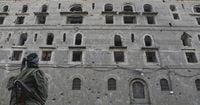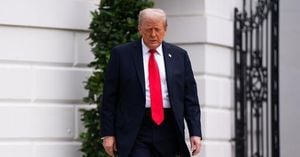Lana Shukri Kataw, the deputy director of UNICEF's office in Yemen, was freed on Thursday, September 11, 2025, after being detained for days by Houthi rebels in Sanaa. Kataw's release marks a rare positive turn in a region otherwise gripped by escalating violence, international standoffs, and deepening humanitarian crises. Her return to Jordan was confirmed by the Jordanian foreign ministry, which had been closely involved in the negotiations for her freedom.
Kataw’s ordeal began on September 4, 2025, when Houthi gunmen stormed UNICEF’s Sanaa office, seizing her and other staff members. According to The New Arab, the raid was part of a wider crackdown by Houthi forces on international organizations operating in rebel-held Yemen. The Houthis, who have controlled Sanaa since 2014, have long had a contentious relationship with foreign agencies, but recent events have seen a dramatic escalation in their tactics. Human Rights Watch reported that on August 31, 2025, armed Houthi units raided several United Nations offices in Sanaa, detaining at least 19 staffers in a single sweep. Kataw was among those taken, subjected to repeated interrogations until her eventual release.
The backdrop to these detentions has been a surge in violence across Yemen, with Israeli airstrikes intensifying over the past week. According to the Associated Press, Israeli forces launched a series of raids on Wednesday, September 10, 2025, targeting sites in Sanaa and other parts of the country. The strikes killed at least 35 people and wounded more than 130, including local journalists Abdullah al-Bahri and Abbas al-Delmi. Their families confirmed their deaths, noting the journalists were covering the unfolding crisis for local outlets 26 September and Sabaa news agency. The strikes also caused significant damage to Yemen’s national museum and other historical sites, putting thousands of priceless artifacts at risk. The Houthi-run culture ministry has since appealed to UNESCO for urgent intervention, warning of the continued devastation of Yemen’s cultural heritage.
The Houthis have justified their recent crackdown on international organizations by pointing to the killing of their unrecognized prime minister, Ahmed al-Rahawi, and several cabinet ministers in an Israeli airstrike the week prior. Human Rights Watch has noted that the group used this incident as a pretext for detaining UN staff and cracking down on perceived foreign influence. The United Nations, for its part, has denied any involvement in espionage or activities against the Houthi authorities.
Jordan’s role in securing Kataw’s release proved pivotal. The New Arab reported that her freedom followed a deal brokered between Jordanian authorities and the Houthis, which included the return of several Houthi leaders from Amman to Sanaa, among them the group’s former foreign minister Hisham Sharaf. Kataw was flown from Sanaa airport to Amman aboard a Jordanian military plane, underscoring the high-level diplomatic efforts at play. Fouad Majali, spokesperson for Jordan’s foreign ministry, credited the Operations and Consular Affairs Directorate and other agencies for ensuring her safe return. "She is now on her way back to the Kingdom," Majali said, reflecting the relief felt by both officials and Kataw’s family.
Kataw’s detention and release are not isolated incidents. The Houthis have repeatedly targeted international staff in recent years. In June 2024, they abducted more than 50 UN and NGO employees across several Yemeni provinces, later referring some—including three UN officials—to a so-called "terrorism court." The crackdown has continued unabated, with dozens of UN employees, NGO workers, civil society activists, and even diplomats still held arbitrarily since 2021. The risks for international staff operating in Yemen have never been higher, and the fate of many detainees remains uncertain. In February 2025, the situation turned tragic when UN food programme staffer Ahmed Baalawi died in Houthi detention in Saada, weeks after being arrested with six colleagues.
The broader conflict in Yemen remains deeply intertwined with regional dynamics. The Houthis, backed by Iran, have positioned themselves as staunch supporters of Hamas and the Palestinians in the Gaza Strip. In recent weeks, they have launched missiles and drones at Israel, with one drone reportedly breaching Israeli air defenses and striking a southern airport. Israel’s response has been swift and forceful, with airstrikes targeting not only Houthi military infrastructure but, as recent events show, also causing civilian casualties and damage to cultural sites.
Houthi leader Abdul-Malik al-Houthi, in his weekly address, accused Israel of targeting media institutions and civilian infrastructure in Sanaa. "Israel is a criminal enemy that targets media institutions in Sanaa in places crowded with civilians ... because it seeks to target everyone," he said, as reported by the Associated Press. The Houthis have vowed that such strikes will not deter their campaign, but the toll on civilians and Yemen’s fragile heritage continues to mount.
Meanwhile, the Israeli military has also expanded its operations in neighboring Lebanon, targeting what it describes as Hezbollah sites for the production and storage of strategic weapons. Lebanese officials, however, have accused Israel of violating a U.S.-brokered ceasefire, pointing to near-daily strikes and incursions into border villages. The regional conflict shows little sign of abating, with each new escalation risking further destabilization.
For Yemen, the latest cycle of violence and repression has compounded years of hardship. The country’s civil war, ongoing since 2014, has devastated infrastructure, displaced millions, and left much of the population dependent on foreign aid. The repeated targeting of humanitarian workers and international agencies threatens to further isolate Yemen from the global community, undermining efforts to provide relief and support to those most in need.
As for Yemen’s cultural heritage, the damage inflicted on the national museum and other sites in Sanaa is a stark reminder of what is at stake. The Houthi culture ministry’s urgent appeal to UNESCO highlights the risks to thousands of artifacts that form part of Yemen’s rich history. AP photos from the scene show the museum’s facade battered and scarred, a symbol of a nation’s past caught in the crossfire of present-day conflict.
In the midst of these upheavals, the safe return of Lana Shukri Kataw to Jordan offers a rare moment of relief. Yet, for the dozens of international staff and countless Yemenis still caught up in the turmoil, the struggle for safety and justice continues. The world watches, hoping for more stories of release and fewer tales of loss.




